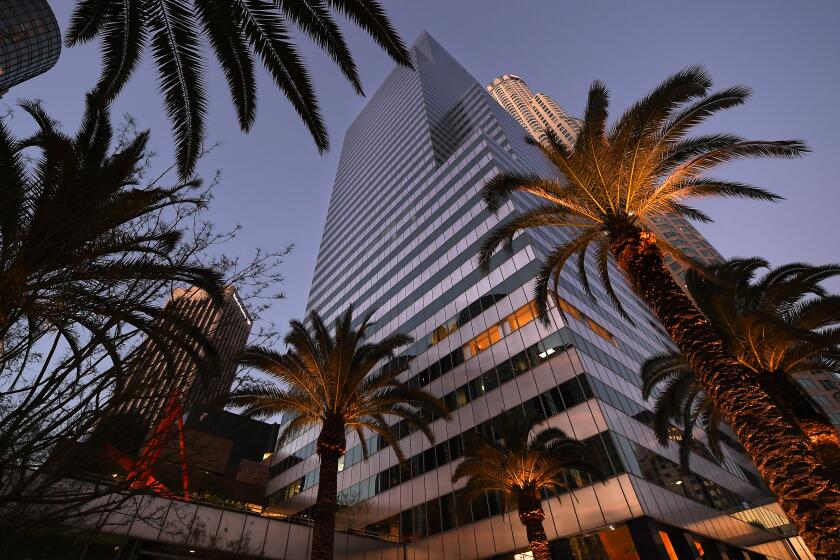Office leasing in L.A. falls to lowest level since Great Recession
- Share via
Office leasing in Los Angeles County fell to its lowest point since the Great Recession in the second quarter as many businesses reeling from coronavirus restrictions and economic uncertainty halted their searches for new space.
Leasing transactions were about 60% to 70% below normal for that time of year, according to real estate brokerage CBRE. Deals were put on hold or canceled in some cases because even walking into an office building seemed risky as the novel coronavirus spread and Gov. Gavin Newsom issued a statewide “stay at home” order in mid-March.
Future demand for office space grew uncertain as companies sent employees home to work remotely for the unknown duration of the COVID-19 pandemic.
“The combination of market uncertainty and the fact that it was difficult to tour space meant that transactions dropped dramatically,” said Eric Willett, director of research in the Southwest for CBRE.
Yet, the office market remained in decent shape from a landlord’s perspective with the overall vacancy rate of 12.8% — still lower than it was a year earlier —and monthly asking rental rates holding steady at about $3.87 per square foot for Class A space.
“It’s not the worst-case scenario some were imagining,” Willett said.
The commercial rental market has stabilized enough lately that many large and small tenants feel comfortable to move forward with lease negotiations, but they are more interested in leases that last a year to 18 months as opposed to terms of five or 10 years that were common in the past.
“We’re still in a period of intense economic and medical uncertainty,” he said.
The jury is also out on how much office space per employee companies will want after the pandemic has been tamed.
Will some businesses shrink their rented office footprint by having most of their workers continue to do their jobs remotely? Might other employers bring their workers back into the office but give them significantly more personal space to prevent the spread of viruses? That would require renting bigger offices than they have now.
“We haven’t seen many move definitively in one direction yet, expanding their offices or contracting them,” Willett said. “We don’t know how those competing push-pull factors will balance out in the long run.”
With no coronavirus vaccine in sight, employers and building landlords are turning to tech, design and distancing to keep office workers healthy.
Since the pandemic started, office leasing in the Los Angeles area has been led by the government sector and the continued growth of the media and entertainment companies that have been in expansion mode for several years.
Landlords have been able to hold the line on rents because occupancy is still stable, but Willett expects prices will come down as the recession continues and supply begins to more acutely exceed demand.
“There are undeniably still strong storm clouds on the horizon” that will cause distress in the office market in the months ahead, he said, “but we don’t expect the level of disruption of 2008 and 2009.”
He also predicted a “robust recovery” in the economy starting by the end of the year and into 2021. The Los Angeles office market will be one of the first in the country to recover, he said, slightly trailing more explosive office markets such as the tech-heavy San Francisco Bay Area and government-oriented Washington, D.C.
Other forecasters expect a gradual economic comeback for California and the nation. The trajectory will look like a “Nike swoosh,” according to a recent UCLA Anderson Forecast, and take about three years to return to pre-COVID levels.
The office market hasn’t been socked as hard as the retail and hospitality sectors of real estate, in which business plummeted as health restrictions were put in place for the pandemic. Apartments and industrial real estate have fared better, with continued demand, low vacancies and stable rents.
More to Read
Inside the business of entertainment
The Wide Shot brings you news, analysis and insights on everything from streaming wars to production — and what it all means for the future.
You may occasionally receive promotional content from the Los Angeles Times.












